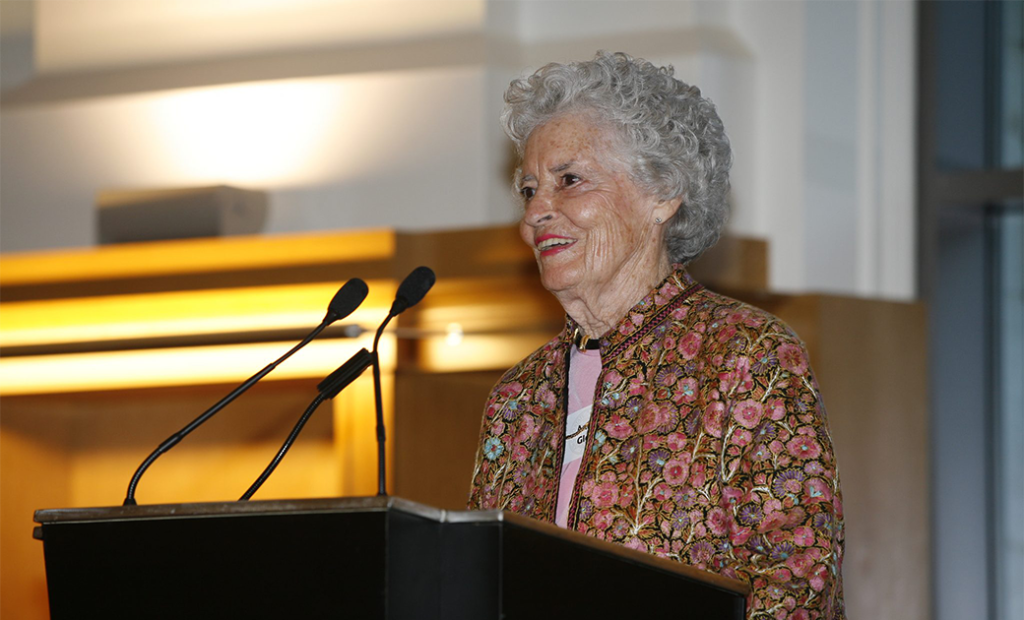
By The Ohio State University’s John Glenn College of Public Affairs
Annie Glenn, the lifetime companion and the wife of national icon John Glenn, was the steadfast alter ego for her hero husband but she didn’t spend her life living in his shadow.
John and Annie were a strong couple — married 73 years — but while John spent his life in the air and in public service, Annie spent hers here on Earth, focused on the people who often go unseen: the disabled.
For more than five decades, Annie wrestled with the burden of a severe stutter, which pulled apart and severed her speech. She was an 85 percent stutter, meaning she would become “hung up on 85 percent of the words she tried to speak, which was a severe handicap,” as John Glenn put it. She knew every time she wanted to speak something could and usually did, go awry.
She lived in fear of the simple tasks most people take for granted – using the telephone, taking public transportation and going shopping. After many years of failed therapy, Annie discovered a program at Hollins University in the 1970s that helped her eliminate faltering speech.
The metamorphosis that followed allowed her to blossom into a champion for those with communication disorders. She publicly shared her heart-rending personal story to draw attention to these little-understood speech impediments.
Annie, who died May, 19, 2020, had been an adjunct professor in the Speech Pathology Department at The Ohio State University’s Department of Speech and Hearing Science. In 1987, the American Speech-Language-Hearing Association (ASHA) created a national award, named “The Annie,” to recognize individuals who best exemplify “Mrs. Glenn’s own invincible spirit.” Recipients have included James Earl Jones, Vice President Joseph Biden, Julie Andrews, Mick Fleetwood and Jane Seymour.
“Annie Glenn was a special kind of public hero. She conquered her own personal challenge – her speech impediment – and appropriately used her position as the spouse of a prominent public person to help advocate for others who struggled as she did. She was also just a really warm and nice person. We’ll miss her as much as we do Senator Glenn,” said Trevor Brown, the dean of the John Glenn College of Public Affairs.
In 2009, Ohio State awarded her an honorary Doctorate of Public Service to recognize her work and humanitarian efforts for adults and children suffering from this debilitating disorder. Several months later, she was accompanied by her husband to Ohio State’s season opener football game against Navy, becoming one of the privileged few to dot the “i” of the Ohio State Marching Band’s Script Ohio formation.
“For many years, Annie served as a guest lecturer for graduate student courses and maintains contact with people afflicted with a stutter,” said JoAnn Donohue, Assistant Clinic Director of the Speech Pathology Department.
“She was very open about her stuttering. She is such an inspiration and she had this wonderful ability to communicate on any level, whether it was a four-year-old or a teenager who was very upset and embarrassed about their speech. One such awestruck teen, emerging from a meeting, swore he’d never wash his hand again after Annie shook it,” said Donohue.
Each year, the Speech Pathology Department selects an individual to receive the “Annie Glenn Leadership Award” for displaying innovative and inspirational work in the area of speech/language pathology.
Those who met Annie, describe her as a sensitive, humble person, who was very generous with her time and involvement in community service for communication disorder organizations, as well as, other groups.
But most often, she was found by her husband’s side. The couple remained devoted to one another until his death in 2016 and never hesitated to jump into the car for long road trips to spend more time together, especially after John retired from the Senate. That unwavering faithfulness does not go unnoticed.
“They were inseparable,” said Deborah Merritt, the first permanent director of the John Glenn Institute of Public Service & Public Policy at Ohio State. “Students hear that they literally met in a playpen and they wonder if they can find a soul mate in their lives.”
The family glue

Her tenacious spirit provided the glue that held her family together, especially during long stretches when Glenn was away serving his country as a combat pilot and test flight aviator and later as an astronaut and politician.
Like many others, the late Paul Tipps, a long-time friend and political advisor to the Glenns’, was astounded by her tenacity. “Not only did she grapple with severe stuttering, but she willingly chose a life with a husband who regularly risked everything for his country, with her full support.”
“Here’s a woman keeping the family together and everything normal and she’s totally supportive of him to keep his commitment to his country. Think how strong-willed a person has to be to do that.”
“She is as much of a hero as John Glenn was and I don’t say that gratuitously. He would not have done what he did without her.”
Annie always took an intense an interest in her husband’s activities. She attended Senate briefings and went to training sessions for the 1998 Discovery mission, overcoming her first reaction.
Dale Butland, Glenn’s long-time press secretary and political advisor, called her “the absolute rock” of the family. “A lot of people on the staff thought she was the most natural politician in the family,” Butland said. “She was enormously and completely supportive of everything he had ever done, that’s not to say that she didn’t have a mind of her own. And she didn’t mind speaking her mind at times.”
A lifetime together

When Annie was 3 years old and John was 2 years old, the two met. Their parents, Homer and Margaret Castor and John and Clara Glenn were friends and the couple grew up together as playmates.
In writing about his wife, Glenn said that “. . . we practically grew up in the same playpen — we never knew a time when we didn’t know each other.”
As the two entered high school, their pairing became the normal course of events. Glenn wrote many years later: “Somewhere in my teens I took a second look at Annie and liked what I saw.”
Toward the end of high school, the couple discussed marriage and toyed with the idea of eloping to Kentucky—but elopement never went beyond being a romantic notion.
Both enrolled in Muskingum College, where Annie majored in music. She played the trombone and piano and also grew to love the pipe organ—developing her skills enough to receive a scholarship offer from The Julliard School of Music.
But, World War II began and John proposed — she declined the scholarship and they were married.
Annie gave birth to son David in 1945, who was followed by their daughter Lyn in 1947. Annie was the stay-at-home parent and family guide during Glenn’s days as a combat pilot in World War II and the Korean War, a test pilot and when he entered the Mercury space program.
Glenn, in public speeches and in his writing, clearly recognizes the contributions Annie made to the family and to the success of his own careers.
He wrote about his life as a Marine in his 1999 memoir.
“ . . . she accepted uncomplainingly the life of that decision — not only the frequent moves and the scramble for housing that each new move required but the dangers inherent in flying and the possibility that I would go back into combat,” Glenn wrote.
Glenn remembered how Annie sobbed with relief during their first conversation after he returned to earth in his Friendship 7 capsule in 1962. She had been told the craft’s heat shield might fail, causing total incineration of the capsule. Glenn had lost contact with controllers for five minutes when he reentered the atmosphere.
Strength of character

“Despite her crippling stuttering problem, Annie always did what she had to do to make things work,” said Glenn.
“Once more it meant that we would face uncertainty, and she would be at home waiting for the outcome,” Glenn wrote. “I knew too, that her speech continued to make life more of a burden for her than it was for many other people, and that I could have alleviated that for her if I had been around more.”
That resilience provoked expressions of amazement from people like Herb Asher who was the first interim director of the John Glenn Institute.
“When you know her life story and her problems with stuttering and you hear the adjustments they had to make, you just say ‘Oh my goodness, how did she get through it?’” said Asher. “I can’t imagine what she went through in terms of being in the public eye, not being able to participate like you and me, and overcoming that.”
Annie’s speech problems forced her to adopt many strategies to cope publicly. She provided written directions to cab and bus drivers and descriptive lists to store associates. Annie referred to the telephone as “an instrument of the devil” so the family always ensured a neighbor was near in case of an emergency when Glenn was gone.
Annie, like others who stutter, was not immune to the cruel jokes and laughter directed toward her, but she stood her ground — a truth well recognized by her husband who wrote: “I saw Annie’s perseverance and strength through the years and it just made me admire her and love her even more. It takes guts to operate with a disability; I don’t know if I would have had the courage to do all the things that Annie did so well.”
After many years of enduring failed treatments, Annie had reached her 50s before learning about The Hollins Communications Research Institute in Roanoke, Va.
“While other programs treat stuttering as an emotional or psychological issue, Hollins sees the condition as a physical disorder, and therapists work with patients to isolate the particulars of speech muscle movements.” said Dr. Ronald Webster, founder, and president of the Hollins Communication Research Institute.
“Annie was a model student during the three weeks of the 11-hour per day classes she took in 1973, and the treatment vastly improved her speech. In a final exercise, she called John Glenn at home and told him that for the first time in her life she had gone shopping and was able to ask for things.”
She, too, is an American hero

In 2015, the American Speech-Language-Hearing Association gave the annual Annie award to Annie Glenn. The Annie recognizes an individual who demonstrates Mrs. Glenn’s spirit by making a positive impact on those with communication disorders. This video was produced for the ASHA Convention Awards Ceremony.
In his memoir, Glenn wrote that he had never heard her speak so many words without a single pause. Their lives were transformed.
Glenn recalled one of her first sentences upon returning home. “John, I’ve wanted to tell you this for years — pick up your socks.”
“Annie’s involvement with Ohio State’s Speech Pathology Department made a big difference for students,” said Rebecca McCauley, a professor at the Department of Speech and Hearing Science. “She was incredibly inspirational to students, many who had not had that much contact with people who stutter.”
“While she inspired many with communication disorders to seek treatment, her caring personality went way beyond disability issues,” said Cheryl Brown, widow of former Ohio Attorney General Bill Brown.
The Glenn’s were long-time friends of the Browns and Cheryl’s husband had a special connection to Annie due to his childhood stuttering handicap.
“I saw how difficult it was for her early on and I saw the improvement she made. She had this incredible ability to not lose focus on a person she was talking to for as long as that person wanted to talk.”
Brown indicated that Annie was there for her after her husband died, staying in regular contact while other friends faded away.
“Her biggest gift to me was her strength of character because I was flat out when Bill died,” Cheryl said. “She, too, is an American hero.”
Photos courtesy of the John Glenn College of Public Affairs. Learn more at https://glenn.osu.edu/about/annie-glenn/



